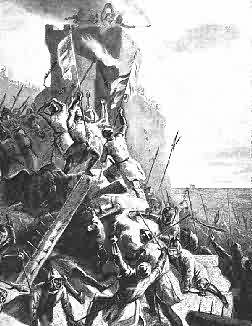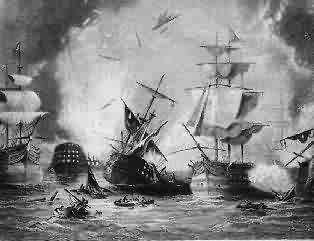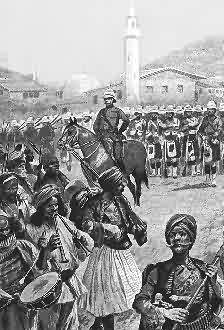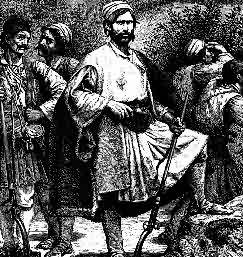
MARCH OF THE TITANS - A HISTORY OF THE WHITE RACE
CHAPTER 36 : THE MELTING POT - ROMANIA, BULGARIA, ALBANIA AND GREECE
Part iv - Greece
GREECE
As recounted earlier, a significant part of the original Indo-European Grecian population in south and the north of Greece had, by the time of the Roman occupation of that country, absorbed enough Middle Eastern and African slaves into their society to cause the downfall of the Classical Grecian civilization and which led to the creation of a biracial population - those Grecians who had not mixed as opposed to those who had.
Dark coloring dominated, with only flashes of original European or Indo-European sub-racial characteristics (light hair and light eyes) showing themselves every now and then. At the time of the division of the Roman Empire into Eastern and Western halves, Greece was included into the Eastern Empire.
By the 3rd Century AD the invading Indo-European Goths had captured Athens from the Eastern Empire, but, once the main body of Goths had moved on, Greece once again sunk into obscurity, surrounded by ruins of the great civilization which had previously existed in that country.
CRUSADER RULE 1204 AD
It was only in the 13th Century that Greece once again featured in European history - the territory fell to the 1204 Crusade, which saw Byzantine itself sacked by the White knights meant to save it.
The Crusaders divided the Greek peninsula into feudal fiefs, the best known being the Duchy of Athens - all the states were incorporated into what officially became known as the Latin Empire of the East. Crusader rule was too short lived and their numbers too small to substantially alter the racial make-up of the region, and they were driven out in 1621 when the Byzantines reconquered Greece.
After the final fall of Constantinople itself in 1453, the Duchy of Athens fell under the direct control of a number of European states, including the French, Spanish, and Italians - all of whom infused substantial amounts of new White blood into the peninsula.

The 200 year race war on the island of Rhodes. Just off the south west shore of Turkey lies the island of Rhodes, where White Knights had established a Crusader state in 1306. Rhodes was subject to numerous attacks by Nonwhite Turks for over two hundred years - each time the attackers were beaten away after fearful battles. With the passage of time, White reinforcements slowly started drying up, and the defenders of Rhodes became fewer and fewer. Finally in 1522, the island was at last overrun by the Nonwhite Turks. Here the White knights can be seen defending Rhodes during the great siege of 1480, where they held out under ferocious attack for more than two months.
THE OTTOMAN INVASION
This process was however to be once again interrupted in 1453 by the Turkish Ottoman invasion. By 1460 almost all of Greece had been overrun by the Ottomans.
Over the course of the next two centuries an unrelenting race war between the invading Ottomans and the major White powers in Greece saw the entire peninsula being overrun by the Turks - the process was completed with the Turkish capture of Crete in 1669.
Greece remained under Turkish rule right until the 19th Century. The result of nearly 450 years of Nonwhite rule led to another infusion of Middle Eastern Nonwhite blood into the Greek population.
The only issue which mitigated against this process was the harsh Turkish rule which led many Greeks to actively avoid integrating with the occupiers. A hatred between Greek and Turk developed over these centuries which lasted, unresolved, right to the end of the 20th Century.
RUSSIAN INTERVENTION - SEEDS OF CHRISTIAN ALLEGIANCE
In the late 18th Century Greek nationalists finally launched a series of attempts to throw the Turks out, aided by Russian adventurers, who felt an affinity with the Greek Orthodox Christian Church (which had been the genesis of the Russian Orthodox Church).
In 1770 the Russian count Aleksey Grigoryevich Orlov landed a Russian fleet in the Pelopennisos and led an unsuccessful revolt against the Turks. In 1821 Alexander Ypsilanti, a former aide-de-camp of the Russian czar Alexander I, entered Moldavia with a small force and proclaimed Greek independence. The Czar however refused to give any support to the expedition, and the Turks crushed the small force, killing all the rebels they could capture.
GREEK NATIONALISTS
Thereafter Greek nationalists fought a series of wars against the Turks. In the first phase they fought without any allies, aided only by money and scattered White volunteers from European countries who felt personal sympathy with the anti-Turkish campaign.
MIXED RACE EGYPTIANS OCCUPY GREECE
Eventually the Turks asked another part of the Ottoman Empire, the branch ruling Egypt, for aid in fighting the Greek rebels - as a result Nonwhite Egyptian troops landed in Greece in 1824, occupying the entire southern peninsula of that country. The Egyptian invasion of the European mainland proved too much for the European powers to bear, and in 1827 a combined White army was rushed to Greece. By the time this naval borne force had reached Greece, Russia and Turkey had become embroiled in an open race war over the region.

A great White victory which gave birth to modern Greece - the Sea Battle of Navarino, which took place on 20 October 1827, was one of the most bloody sea battles in history. On 11 April 1827, Greek nationalists set up a free state on the island of Corfu, as part of their long campaign to win independence from the Nonwhite Ottoman Turks. The Turkish sultan then sent an ultimatum to the Western powers - Russia, Britain and France - demanding that the right to settle the Greek question was his and his alone. The White powers then concentrated their fleets in Greek waters, and joined battle with a Turkish fleet at Navarino. The struggle lasted four hours and the Whites were utterly victorious. 120 Turkish ships were sunk with almost their complete crews. This White victory spurred on further White attacks on land, culminating in the independence of Greece under European protection in 1830.
TREATY OF ADRIANOPLE
The arrival of the White European army and the build up of the White Russian army forced the Turks to seek an armistice: the Treaty of Adrianople signed in 1829 ended the war with Russia and forced the Turks to accept White European control over Greece. The Egyptians left, and in 1830 Greece was declared an autonomous kingdom under European protection.

The Turks driven off Cyprus. The Nonwhite Turks were forced to cede Cyprus to the British in 1878, and lost yet another important outpost in the Mediterranean. Here the White British troops are seen watching over the withdrawal of the Nonwhites - the latter's racially mixed origins well captured by this illustration. Cyprus was to become the focus of a continued conflict between Greece and Turkey, and was eventually subject to a renewed Turkish invasion in 1974. Greek forces rushed to Cyprus to protect Greek nationals and the island had to be partitioned between Greek and Turk - an issue which was still not resolved by the end of the 20th Century.
INDEPENDENCE MARRED BY STRIFE
By now, however, even larger elements of the Grecian population had become mixed with the races of the various conquerors so that the biracial nature of the society became even more marked. A period of civil war and strife followed independence in 1830.
This was aggravated by a number of poor rulers, including a Bavarian king, Otto 1, who was given the throne in 1832 by the European protectors of Greece.
Only in 1864 was a more stable constitution introduced in Greece, based on universal male adult suffrage, under a king from Denmark appointed by the British. A national plebiscite amongst the Greeks chose Prince Alfred, second son of Queen Victoria of Great Britain, as king, but the British government rejected the offer and nominated Prince William George, second son of King Christian IX of Denmark.
MACEDONIA AND CRETE
An unsuccessful attempt to seize the territories of Macedonia and Crete from the Turks by open war was thwarted by the intervention of the European powers in 1879. Undeterred, the Greeks encouraged rebellions in both these territories. In 1886 the Cretans revolted against their Turkish rulers, and Greece sent an armed expedition to the island to come to their aid.
Then members of a secret Greek society dedicated to driving the Turks out of Greece, the Ethnike Hetairia, attacked the Turks in Macedonia, sparking off a war with Turkey. The Greeks were initially severely defeated in this war, and once again it was only the intervention of the Western European powers that prevented the Greeks from being utterly routed.
Only in 1898 was Turkey finally compelled by the European powers to withdraw its forces from Crete. The island was placed under the joint protection of the European powers and by 1912 the island had been formally reunited with Greece.
In Macedonia however, it was only in 1903 that a Slavic insurrection broke out - most of the rebels declared their aim to be unity with Bulgaria. In 1912 all the Balkan states formed an alliance against the Turks, and the result was the First Balkan War, which saw Turkey utterly defeated and was driven out of almost all of its European continental possessions.
Greece and Serbia fought Bulgaria immediately afterwards over the former Turkish territories - Bulgaria was defeated and Macedonia and two other regions were added to Greece.
WORLD WAR I - REWARDED WITH THRACE
Greece remained neutral during the First World War until 1917, when it entered the conflict on the side of the Allies. As a reward Greece received western Thrace from Bulgaria; and obtained eastern Thrace and many of the Aegean Islands from Turkey.
A period of internal dissension followed with successive coups, royal governments and attempted democracies all failing one after the other - the unrest ended when a particularly strong dictatorship emerged in 1936.
WORLD WAR II - CRETE INVADED FROM THE AIR
Greece remained neutral in the Second World War until the country was attacked by Italy from Albania in October 1940. The Greek army however not only stopped the Italian invaders but also threw them into a headlong retreat. Only a German invasion in April 1941 saved the Italians from certain defeat, as by then the Greeks had taken a quarter of Albania from the Italians.
Greece formally surrendered to the Germans the same month of the invasion. A pro-Nazi government was then installed in Athens after the island of Crete was invaded by a German airborne force, the first great airborne invasion in history.
Many Greeks actively resisted the German occupation, whole heartedly supporting Communist partisans who operated with relative ease in the mountainous countryside. By October 1944 the German army had withdrawn from Greece, and rivalry between the competing Grecian partisan forces saw British troops being sent to Athens to try and stabilize the situation.
CIVIL WAR
Civil war however erupted between the competing partisans, which only ended in February 1945 with a settlement offering all parties a chance to form part of the government.
In spite of this settlement, the Communist supported partisans resumed their war - it dragged on until 1949 when, exhausted, all sides agreed to halt.
A democratic form of government was then introduced but remained unstable due to the large number of parties represented in it.
CYPRUS - INDEPENDENCE 1960
The island of Cyprus, which had been a British possession since its seizure from the Turks in 1878, became the next focus of Greek foreign policy. Requests by the Greek government that the island be allowed to vote on possible union with Greece were rejected, and the island was formally granted independence in 1960.
THE COLONELS' COUP
In 1967 Greece was subjected to yet another coup which saw a group of army officers seize power. Thousands of Communists were arrested and many civil liberties were suspended. The army remained in control until 1974.
In 1974 the Turks invaded Cyprus, claiming it as their own in the light of the large Turkish population on the island. Greece rushed troops to the aid of the Greek portion of the population. After a brief conflict the island was partitioned into Greek and Turkish zones, a situation which still existed at the end of the 20th Century. The crisis provoked by the Cyprus invasion combined with continued unrest in Greece caused the military junta to step down in Greece. Democratic elections were allowed, after which various civilian governments came to power, none of which substantially improved the condition of the country as a whole.

A certain amount of Turkish blood entered Greece during the 450 years that country was occupied by the Nonwhites. Although not all Greeks were affected in this way - the harsh Ottoman rule caused many Greeks to actively avoid physical integration with the Nonwhites - it is so that a significant percentage of the Greek population became of mixed racial descent. Here is a 19th Century woodcut well illustrating a group of Greek brigands, who in dress and physical appearance, show the mark of four centuries of Turkish rule.
IMMIGRATION - THIRD WORLD ENTRY POINT
Although not a prosperous nation in its own right, Greece has become the focus of Third World illegal immigrants, if only as one of the first ports of call by such immigrants in their attempts to move on to Western Europe. The effect of this population shift is discussed in a separate chapter.
or back to
or
All material (c) copyright Ostara Publications, 1999.
Re-use for commercial purposes strictly forbidden.